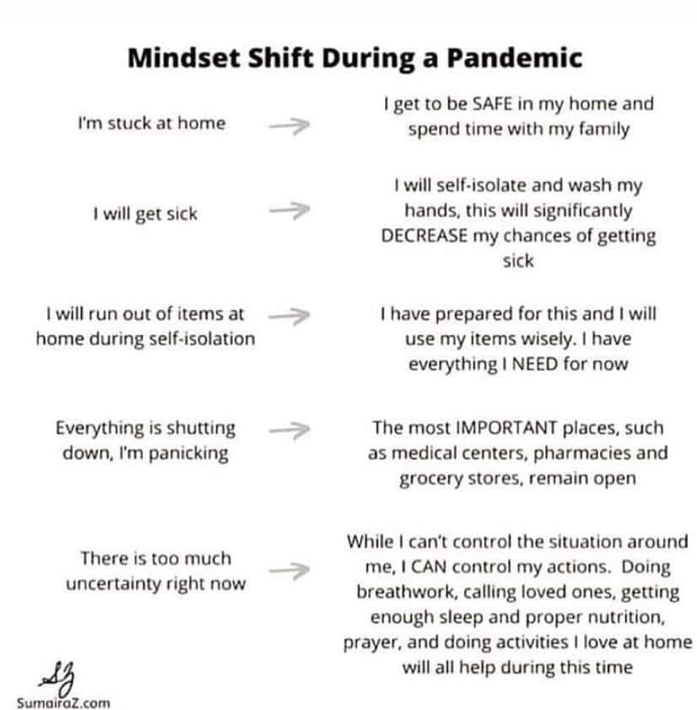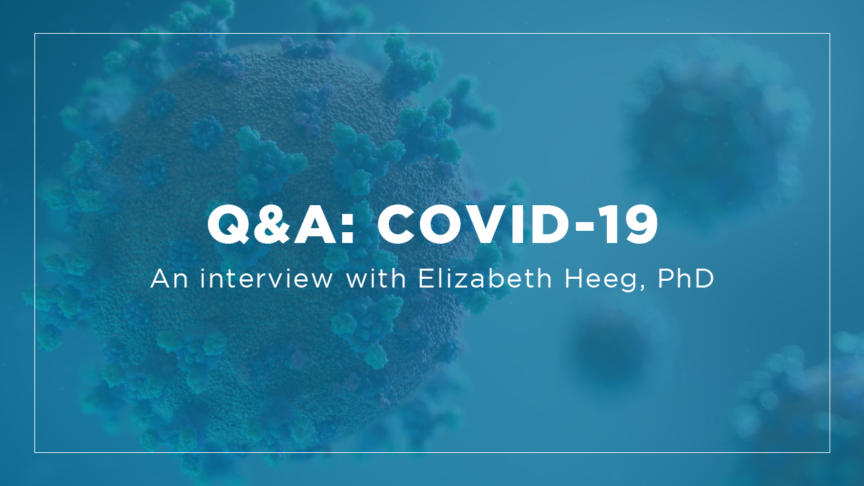Elizabeth Heeg is a long-time member of Trinity Church and a biology professor at Northwestern College. Elizabeth received her PhD in the area of Molecular Biology and has been teaching and advising pre-health professions students for over 12 years. One of her former students from NWC works at a biotech lab that is essential in providing diagnostic reagents for COVID-19. As a trusted scientist and researcher, we interviewed Elizabeth for her perspective on COVID-19.
Coming at this from a scientific perspective, why is the coronavirus something we should take seriously?
While the mortality rate (percent of people that die when they are infected) may appear to be lower than other diseases, this virus is very contagious. The need for hospitalization is 230 times greater based on the numbers I have been able to gather from the CDC.
Why is it important that we practice physical/social distancing?
Physical distancing is so key to stopping this virus from spreading. Viruses cannot move by themselves. In fact, scientists have typically defined them as non-living parasites. So, coronavirus-19 gets around due to us humans. If we just stay put and limit our interactions, we will have a much easier time tracking who is sick and who isn’t.
I dare to guess that many of us will get COVID-19, but how many of us get it at once is the key thing here. If too many of us get it at once, our hospitals will not be able to care for us due to the sheer number of us all at once.
The strangest analogy popped into my head as I was thinking about how to address the need for physical distancing. I came up with: Dandruff. (If the dandruff analogy doesn’t work for you, replace the word “dandruff” with “glitter.” All of you that have come in contact with glitter will be nodding your heads in agreement, I am sure.)
Let’s pretend a contagious version of dandruff exists that requires 15% of those who get it to be hospitalized and appears to cause death in approximately 4% across all those who get this dandruff (and this rate is higher in certain age categories). A person may not realize they have dandruff and goes around to all these different events where they shed their dandruff unknowingly. Some people get contaminated by that dandruff and some even start making their own dandruff. The more that people with infectious dandruff physically interact with others, the more this dandruff condition is going to spread.
Staying home and limiting our physical contacts with people to that which is absolutely essential, will allow us to slow the spread of that infectious dandruff and give scientists time to get better at diagnosing the dandruff and finding a treatment for it.
If too many people get this dandruff at one time and many of them have to be hospitalized, there’s no way our hospitals can handle that many people with dandruff (aka COVID-19). I could take this a step further and say, if you noticed you had some dandruff, but it went away, we still have to be really careful. Some studies demonstrate that this “dandruff” can continue shedding for up to 37 days in some cases. Half of the people followed shed “dandruff” for more than 20 days!
Not everything we find online or on social media is trustworthy. Where can we find accurate and up-to-date information about the coronavirus and its spread?
I trust the World Health Organization (https://www.who.int/) as one of my top sources. Next, the CDC (https://www.cdc.gov/). Early on, I followed the interactive map established by Johns Hopkins (recommended to me by Dr. Tim Huffman; a math professor at Northwestern when this pandemic was just getting started in China) (https://coronavirus.jhu.edu/map.html). Due to the volume of information coming in, they note that it isn’t as accurate and up to date as they would like.
I also try to stay up to date by following the daily releases from Johns Hopkins and find myself in awe of the speed of publications being published in The Lancet (a weekly peer-reviewed medical journal that is highly respected by medical experts; it is known as the world’s oldest, most prestigious medical journals) regarding how this virus seems to be working.
Follow Governor Andrew Cuomo’s press releases too. He seems to understand the facts, the details, and the issues.
To be honest, I also rarely watch the news in this current situation. A lot of the broadcasters fill me with anxiety, so I would rather read things with a dry monotone voice in my head 😊 from hopefully unbiased organizations that have nothing to gain by sensationalizing their information.
What should I do if I experience symptoms of COVID-19?
Call your local clinic. Do NOT go directly to the hospital. Call first and get instructions.
This quote is directly from our facilities in Orange City, “Patients experiencing fever, flu-like symptoms, or those who have been exposed to anyone with these symptoms in the past 14 days should call their physician before being seen.
For more information or questions, call 712-737-2000.”
What does loving your neighbor look like in this season of physical distancing?
For my kids and I, loving our neighbor looks like calling the person that is in one of the high-risk categories and seeing if they need anything.
Loving our neighbors means decorating Easter eggs and taping them in our windows so parents can drive around and have their kids spy Easter eggs throughout town. Those eggs bring a smile to my face when I see them in people’s homes too. Loving our neighbors means doing our best to spread reliable information. Loving for us means fact-checking and being open to others helping us refine our conclusions.
How can we shift our negative mindset to a positive mindset during this pandemic?
I came across this info and really appreciated its message. I have also really tried to find the good in my day…and that is saying a lot, because it is a challenge for me to do that. For me, a positive mindset includes realizing I am still healthy, and I am doing my part for the larger community.

What does “making the most of this situation” look like in your house?
Making the most of this situation in my house means finally using my home office 😊 It means buying and trying to put together a 2000-piece puzzle. It means video messaging with my nephew and niece to read them books so their parents can catch their breath. And my favorite so far, it means recording silly dances/music videos for the silliest songs my kids can find (e.g., Silly Songs With Larry). I would love to share those with everyone, but I promised my kids I wouldn’t. I think they’re just looking out for me, because I take being silly very serious.

